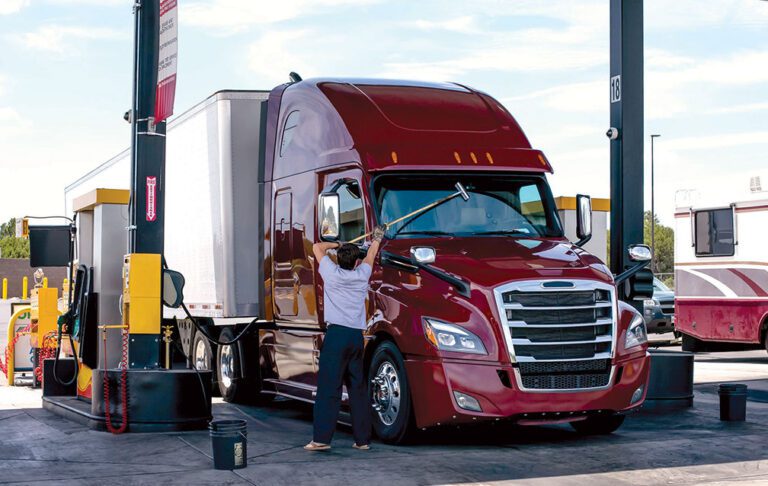From blazing sunlight to pitch darkness, fog, snow and everything else nature can present, a truck driver’s eyes take an incredible amount of abuse.
Unquestionably, eyesight is the most important of the professional driver’s senses. Not only does the driver need the ability to see other objects, but also to determine distance, estimate speed and make split-second decisions that can have life or death consequences.
Vehicle manufacturers design their products to provide maximum visibility and to overcome everyday hazards such as darkness and rain. However, the responsibility for maintaining these systems — including lights, windshields/windows, wipers and mirrors — falls on the driver. Failure to do so creates a handicap that, sooner or later, the driver may not be able to overcome.
Windshield and windows, for example, are harder to see through when they’re wet and dirty. It’s a good habit to clean them frequently. Most truck stops provide devices to do this, but those devices vary in type and in quality. A bucket of soapy water, a long-handled brush and a spray from a water hose at the fuel pump can make short work of dirty windows. A dilapidated squeegee and a container of muddy water won’t do nearly as good a job.
While it’s easy to advise looking for truck stops that provide the former, fuel prices and the availability of parking and food may be more important considerations. There is, however, no rule preventing the driver from carrying his or her own bucket and brush, and it’s a good idea to do so.
Mirrors also need to be kept clean, and they can get dirty quickly. Mirror brackets and the shape of the mirror housing can direct air onto the mirror’s surface, carrying water, deicing chemicals and dirt in the slipstream.
Heated mirrors can help dry the water, but this process leaves any contaminants dried onto the mirror’s surface. Frequent cleaning is a must. It’s a good idea to keep a small squeegee or some paper towels, along with a spray bottle of cleaner, in the truck. A quick spray and wipe just before backing up can make a world of difference.
Of course, mirrors are most effective when properly adjusted. Most modern trucks are equipped with enough mirrors, both flat and convex, to allow the driver to view most of the blind spots around the vehicle.
Flat glass (often called “West Coast”) mirrors should be adjusted to show a minimal amount of the truck and trailer and as much as possible of the space next to the vehicle. Convex mirrors should provide as large a viewing area as possible.
For the windshield, working wipers are imperative, as is a working washer system. Wiper blades are made of rubber that must be in good condition. Softer rubber cleans the glass surface better — but it also wears out more quickly.
Replacing wipers is a necessary expense; wipers should be changed at the first sign of streaking or loss of coverage.
Washer solvent is particularly valuable when roads are wet, especially if anti-icing chemicals or salt have been used on the road surface. Washer solvent is sold in a variety of quality levels. Cheap washer fluid can solidify in the narrow lines and nozzles that spray the windshield, and it may freeze at nearly the same temperature as plain water. Once frozen, it can be difficult to get everything thawed and get the washer working again. Quality solvent may cost more, but it is well worth the price when conditions are rough.
Also keep in mind that windows and mirrors can’t be effective if they are blocked by items inside the truck. The passenger seat might be a convenient spot to store luggage or other things, but if they block your view from the window or in the mirrors, it’s a self-created hazard. Using the dashboard as a shelf for paperwork, trash and other items can block visibility. Further, light-colored items can be reflected in the windshield, creating a distraction, especially at night.
Technology has provided the driver with more information than ever before, but that same technology creates a hazard if mounted in a manner that blocks visibility. Regulations set by the Federal Motor Carrier Safety Administration prohibit mounting items on the windshield in the area covered by the wipers.
Steering wheels are often adjustable. This won’t help with windows and mirrors, but visibility is important for viewing gauges and driver controls. If the driver has to shift their position to see the gauges, the steering wheel should be adjusted to a point where visibility is maximized.
The sun can be brutal at times, especially when reflected off snow or water. Tinted windows and visors can help, but every driver occasionally needs more help. A pair of quality sunglasses is a must.
At times, the sun comes in from an angle that no amount of visor adjusting can block. A baseball or trucker’s cap can be a valuable tool. It may look crazy — or cool, depending on your point of view — but the hat can be worn with the bill in any position necessary to block the glaring sun.
Sometimes vehicle positioning can help, too. Following another truck closely can be dangerous when traveling at speeds that don’t allow for stopping if the truck in front brakes suddenly. Even at slow speeds, however, if trailer doors are taking up most of your field of vision, backing off will increase the area you can see.
Finally, rest is an important factor in eyesight. Drivers who are fatigued often don’t keep up the continuous eye scan needed to remain aware of hazards all around the vehicle. In addition, tired drivers may not process the information gathered by their eyes, leading to errors in judgment. And, of course, closed eyes don’t see anything.
Keep your truck’s glass and mirrors clean, use all of them and don’t drive when fatigued, and you’ll find it easier to identify and deal with the hazards every trucker faces every mile they drive.
Cliff Abbott is an experienced commercial vehicle driver and owner-operator who still holds a CDL in his home state of Alabama. In nearly 40 years in trucking, he’s been an instructor and trainer and has managed safety and recruiting operations for several carriers. Having never lost his love of the road, Cliff has written a book and hundreds of songs and has been writing for The Trucker for more than a decade.








